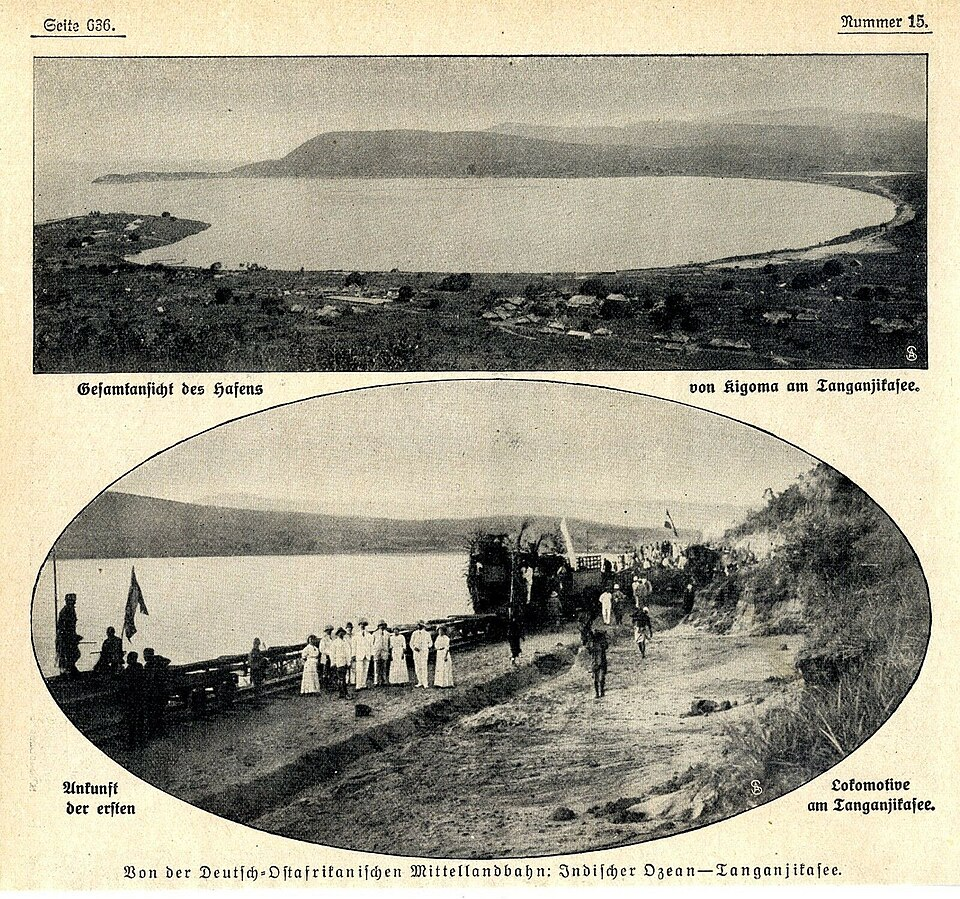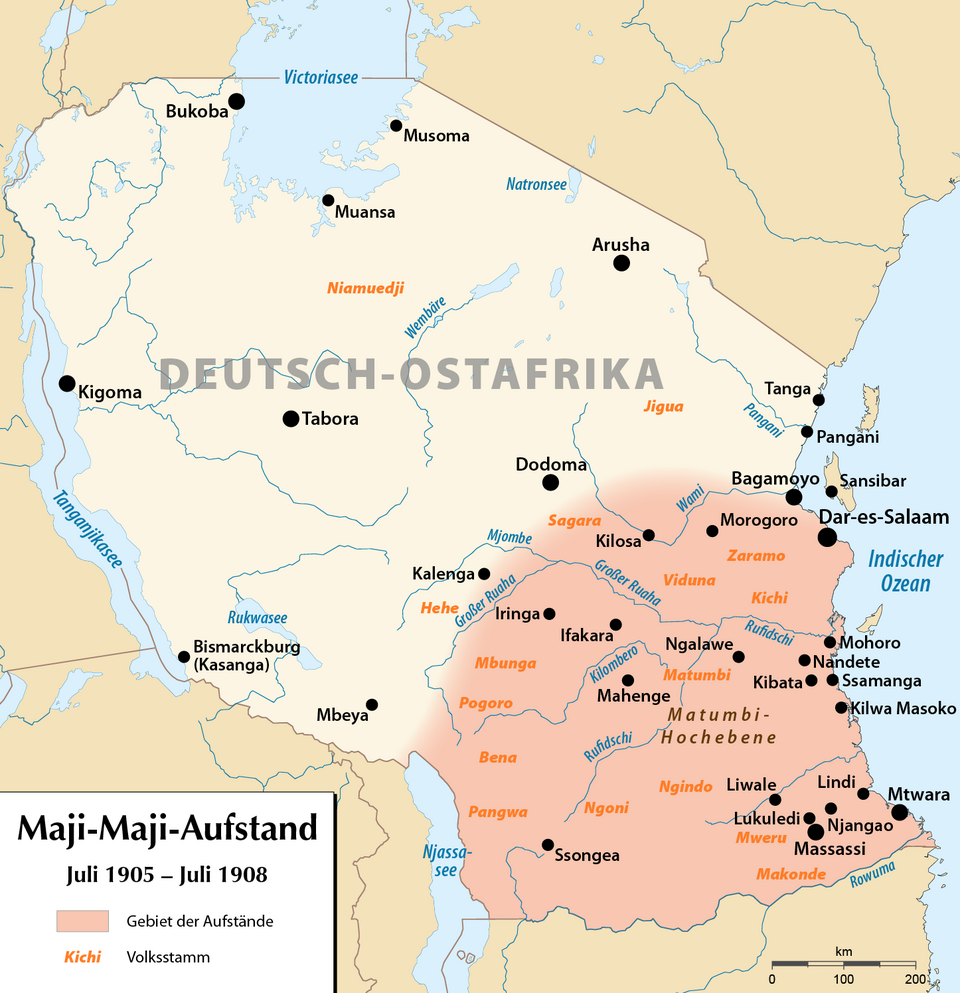IB Syllabus focus:
'Compare the colonial administrations of Germany and Britain in Tanganyika, examining their influence and the significant developments until Tanganyika's independence in 1961.'
Introduction to Colonial Tanganyika
Tanganyika, once a focal point of the scramble for Africa, experienced multifaceted colonial governance through German and then British rule. This era was marked by profound changes in administration, economic policies, societal shifts, and the gradual emergence of an independence movement.
German Rule (1890-1919)
Establishment and Expansion
Initial Conquest: Carl Peters’s treaties laid the foundation for the establishment of German East Africa.
Imperial Goals: Germany sought to expand its empire and exploit the region’s resources.
Governance and Administration
Bureaucratic System: Centralised authoritarian rule with directives from Berlin, implemented by a Governor and district officials.
Legal System: German code was applied, often disregarding customary laws.
Economic Exploitation and Development
Resource Extraction: Focused on extracting resources through plantation agriculture and introduced new crops.
Infrastructure: Development of railways and roads to aid the transport of goods for trade.

The first locomotive arrives at Lake Tanganyika on the Central Line (Mittellandbahn), completed under German colonial administration to carry plantation produce from the interior to the coast. Railways were central to the colonial export economy and to projecting administrative control. Source
Societal Impact and Policies
Land Alienation: Displacement of local communities for plantation establishment.
Cultural Suppression: Attempts to impose German culture and language on the local populace.
Rebellion and Resistance
Maji Maji Rebellion: A defining moment of resistance which exposed the brutality of German colonial military responses.

This map locates the main regions affected by the Maji Maji Rebellion (1905–1907) within German East Africa. The red-shaded area conveys the spread of the revolt across southern and central Tanganyika; boundaries are approximate and some labels are in German (extra detail beyond the syllabus). Source
Aftermath of the Rebellion: Led to reforms in administration and labour but left deep scars in the society.
British Mandate (1919-1961)
Transition and Administration
League of Nations Mandate: Britain took over the administration as a mandatory power, restructuring governance.
Governance Philosophy: Shifted towards indirect rule, integrating local leaders into the administrative framework.
Economic Transition and Development
Agricultural Shift: Focus on sustainable agriculture and diversification of cash crops.
Infrastructure Improvement: Continued expansion of transportation and communication networks.
Social Policies and Impact
Healthcare Initiatives: Efforts to combat endemic diseases and improve public health standards.
Educational Reforms: Slowly increased the focus on formal education with limited access for the indigenous population.
Labour Reforms and Standards
End of Forced Labour: Abolition of the remnants of forced labour practices from the German era.
Improvement of Workers’ Rights: Implementation of laws to safeguard worker rights, albeit with limited enforcement.
Political Developments and Nationalism
African Political Awakening: Rise of political consciousness and the formation of movements like TANU.
Constitutional Changes: Gradual inclusion of African representatives in legislative bodies.
Path to Independence
Negotiations for Self-rule: Steady negotiations led by African leaders for independence.
Independence Achieved: Tanganyika attained independence on December 9, 1961, with Julius Nyerere at the helm.
Comparative Analysis of German and British Rule
Administrative Differences
German Authoritarianism vs British Bureaucracy: German rule was noted for its direct and often militaristic administration. In contrast, British rule was characterised by a more bureaucratic approach with a level of respect for existing hierarchies through indirect rule.
Policy Implementation: Germans were more rigid, whereas the British showed a degree of flexibility, allowing traditional customs to coexist with colonial law.
Economic Strategies
Extraction vs Sustainability: Germans were focused on immediate economic exploitation, while the British invested in sustainable development.
Infrastructure Development: Both colonial powers developed infrastructure, but the British were more systematic and expansive in their approach.
Societal Structures and Education
German Cultural Imposition vs British Assimilation: Germans tried to impose their culture, whereas the British employed a policy of assimilation, promoting English language and British customs.
Education Systems: The German education system was more technical and exclusive, while the British established a broader, though still limited, educational system.
Labour and Social Policies
Labour Conditions: German colonial rule was notorious for harsh labour conditions, while the British introduced reforms to improve these conditions, though actual changes were often slow and insufficient.
Social Development: British policies towards social development were more progressive, including advancements in healthcare and social services.
Resistance and Response to Colonial Rule
Resistance: German rule was met with armed rebellions, while under British rule, political movements and non-violent resistance became more prominent.
Adaptation to Resistance: The British were more adaptive, making concessions and reforms in response to political pressure, a stark contrast to German military responses.
Significance of Colonial Legacies
Lasting Impacts: Both German and British colonial legacies have had enduring effects on Tanganyika’s socio-economic and political structures.
Colonial Comparisons: The comparison between German and British rule in Tanganyika highlights the variety of colonial administration and its lasting influence on post-colonial governance and society.
Key Figures and Events
Under German Rule
Carl Peters: Instrumental in the founding of German East Africa.
Maji Maji Leaders: Key figures in the resistance against colonial rule, symbolising the anti-colonial struggle.
Under British Rule
Julius Nyerere: Nationalist leader who played a significant role in the transition to independence.
British Governors: Representatives of British rule who oversaw the administration and response to the growing demand for independence.
In studying Tanganyika’s colonial history, it becomes evident that colonial rule, whether German or British, had profound implications for the territory’s developmental trajectory. The comparative examination of these periods reveals the contrasting methods and legacies of European imperialism in Africa. These legacies played a pivotal role in shaping the post-colonial political landscape and the socio-economic development of what would become the modern nation-state of Tanzania.
FAQ
During German rule, the main cash crops introduced were coffee, cotton, sisal, and rubber. These were grown on plantations, often using forced or coerced local labour. The impact on the local economy was significant: many local communities were displaced to make way for these plantations, and there was a substantial shift from subsistence agriculture to cash crop production which left them vulnerable to market fluctuations.
Under the British, the focus continued on cash crops, but with an increased variety, including tea and tobacco, alongside efforts to encourage smallholder production to reduce economic vulnerability and improve sustainability. The British policies aimed to stabilise the economy by diversifying exports and reducing reliance on single commodities. This shift had a more mixed impact on the local economy, providing some peasants with the means to participate in the market economy while also integrating Tanganyika into the global capitalist system in a subordinate position.
Under German rule, healthcare and education policies in Tanganyika were rudimentary, with minimal investment in public health and an education system that was largely designed to serve the colonial administration and train a small cadre of local workers for the service of the state. Education was not widely accessible, and healthcare services were limited, focusing on the health of Europeans and workers critical to the colonial economy.
The British, taking over after the First World War, instituted more comprehensive public health measures, tackling diseases such as malaria and sleeping sickness, which were endemic in the region. They also made more significant, albeit still limited, efforts to expand access to education. Missionary schools were the primary providers of education, and the colonial government slowly began to support the expansion of educational opportunities, albeit primarily to create a class of educated Africans who could assist in administration.
The Maji Maji Rebellion, which took place from 1905 to 1907, was a significant uprising against German colonial authority, and it marked a crucial turning point in the German administration of Tanganyika. The brutal suppression of the rebellion resulted in tens of thousands of deaths, highlighting the harshness of German rule. In its aftermath, the German government realised the need to reform its policies to prevent future insurrections. There was a subsequent effort to moderate the harsh labour conditions and improve relations with local communities. The colonial administration began investing more in infrastructure and public services to pacify the population. These changes, however, were not sufficient to erase the memories of the harsh treatment, and the rebellion remained a symbol of resistance against colonial oppression, influencing future generations in Tanganyika.
German economic policies in Tanganyika were largely exploitative, focused on immediate economic gain primarily through the establishment of large-scale plantations which necessitated the introduction of cash crops like coffee and rubber, often at the expense of local food production and land rights. This approach was labour-intensive and often involved forced labour and harsh conditions. Conversely, the British economic policies, while still geared towards imperial benefit, placed more emphasis on sustainable agricultural development and economic diversification. The British improved the infrastructure that the Germans had initiated, further developing the railway system and road network to facilitate trade and administration. The British also introduced new agricultural practices and encouraged the production of different cash crops, which aimed at developing the local economy for the long term.
Under British rule, local leaders played a significant role in the administration of Tanganyika through the policy of indirect rule. This approach was designed to utilise existing tribal and local governance structures, positioning chiefs and local leaders as intermediaries between the colonial government and the populace. They were responsible for collecting taxes, maintaining law and order, and implementing colonial policies at the local level. While this system allowed some degree of autonomy, it was also a means for the British to govern more effectively with fewer resources and to co-opt local elites, thereby creating a collaborative class that could help manage the broader population. These leaders were pivotal in maintaining the British influence in rural areas and in the execution of developmental projects.
Practice Questions
The German colonial administration in Tanganyika was distinctly direct and authoritarian, focusing on exploitation and resource extraction through a centralised system. German rule was often enforced militarily with little regard for local governance structures. In contrast, British colonial rule, under the League of Nations mandate, adopted indirect rule, integrating local leaders into the administrative process and emphasising sustainable development. While the Germans imposed their culture, the British utilised policies of assimilation. The British administration also made efforts to improve social conditions, including labour rights and healthcare, unlike the harsher labour conditions under German rule.
The colonial legacies of Germany and Britain in Tanganyika significantly influenced the path to independence. German rule left a legacy of economic exploitation and cultural suppression, but also of resistance, exemplified by the Maji Maji Rebellion. This resistance laid early foundations for anti-colonial sentiment. The British rule, despite its exploitative motives, inadvertently fostered political awakening through education and administrative participation. Nationalist movements, most notably TANU, emerged under British rule, leveraging the political structures to push for independence. Both colonial experiences collectively imbued Tanganyika with a resolve for self-governance that culminated in its independence in 1961.

